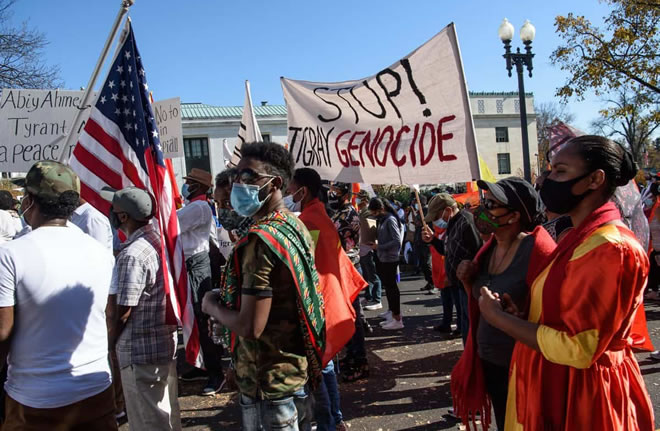
Jason Burke, Africa correspondent
Wednesday November 11, 2020

Ethiopians call for the end of the government's military actions in the northern Tigray region in front of the US State Department in Washington, DC, on 9 November 2020. Photo: AFP/Nicholas Kamm
Thousands of refugees fleeing fighting in northern Ethiopia’s Tigray region have crossed into neighbouring Sudan, as fears grow that conflict between national and provincial forces could prompt a serious humanitarian crisis.
As many as 8,000 Ethiopians are thought to have already crossed the border in the last two days, and aid officials say hundreds of thousands more are likely to leave their homes if the conflict, now entering its second week, does not end.
Ethiopia’s prime minister, Abiy Ahmed, launched military operations in Tigray last week, after he accused local authorities of attacking a military camp in the region and attempting to loot military assets. The Tigray People’s Liberation Front (TPLF), which is in power in the province, denies the attack and has accused the prime minister of concocting the story to justify deploying the offensive.
Sudanese frontier officials described hungry and tired children, as well as casualties from the fighting, arriving in Sudan after a difficult journey.
“More and more people, including wounded from the operations there, are still coming. The numbers are increasing rapidly. There are lots of children and women,” said Khalid Al-Sir, the head of the government refugee agency in Kassala state, in east Sudan.
“They are arriving very tired and exhausted. They are hungry and thirsty since they have walked long distances on rugged terrain.”
Local authorities are overwhelmed and the situation on the ground is deteriorating rapidly, Sir said.
The fighting has involved clashes between ground troops, air strikes and artillery duels, with heavy casualties reported on both sides.
Airports in Tigray are closed, roads blocked, internet services cut off and even banks are no longer operating. Sajjad Mohammad Sajid, the United Nations’ humanitarian chief in Ethiopia, said on Tuesday evening that long lines had appeared outside bread shops and supply-laden trucks are stuck at the province’s borders.
Sajid told the Associated Press that up to 2 million people in the now isolated province were having a “very, very difficult time” and were short of fuel or food, or both.
In his most recent statement, Abiy said the offensive in Tigray was “proceeding as planned” and brushed aside requests from the UN, the UK and the African Union for an immediate end to hostilities.
“Operations will cease as soon as the criminal junta is disarmed, legitimate administration in the region restored, and fugitives apprehended [and] brought to justice,” Abiy posted on Twitter.
Both sides have claimed successes, including federal troops taking an airport and Tigrayans alleging they downed a jet. With limited communications to the region and outsiders barred, it is difficult to verify such statements.
The government has confirmed, however, that the TPLF is controlling a compound of the powerful Northern Command military in Tigray’s capital, Mekelle.
“It looks like, unfortunately, this may not be something which can be resolved by any party in a week or two,” Sajid said. “It looks like it’s going to be a protracted conflict, which is a huge concern from the point of view of protection of civilians.”
The TPLF dominated Ethiopia’s governing coalition for decades before Abiy came to power in 2018. He won last year’s Nobel peace prize for ending a war with neighbouring Eritrea.
The sweeping political reforms the 44-year-old former soldier pushed through won wide praise, but have allowed old ethnic and other grievances to surface.
Tigrayan leaders have complained of being unfairly targeted in corruption prosecutions, removed from top positions and blamed for the country’s problems.
The postponement of national elections due to the Covid-19 pandemic aggravated tensions and when parliamentarians in Addis Ababa, the capital, voted to extend officials’ mandates, Tigrayan leaders went ahead with regional elections in September that Abiy’s government deemed illegal.
Both sides have access to heavy weapons, armour and considerable stocks of ammunition, and observers have warned that a lengthy conflict is possible.
This would be immensely damaging to a fragile country, and region.
The leaders of Oromiya – the largest of Ethiopia’s nine ethnic-based regions with about 35 million people – and of Amhara, have said they are planning anti-TPLF protests for Thursday in what appeared to be a government campaign to build support for the offensive.
The rallies would protest about “atrocities” and “treason” by the TPLF, said Gizachew Muluneh, a spokesman for the Amhara regional government, which backs Abiy.
There are reports of the targeting of ethnic Tigrayans across Ethiopia, the Tigray Communication Affairs Bureau said in a Facebook post.
Addis Ababa’s police commissioner said on Sunday that the government had arrested 162 people in possession of firearms and ammunition, on suspicion of supporting the Tigrayan forces. It was not clear if two journalists who have been detained were among that group.
The Committee to Protect Journalists, a global campaign group, called the arrests of the reporters “a dangerous reversal of the early steps taken by [the] government to improve press freedom”.
The standoff leaves nearly 900 aid workers in the Tigray region struggling to contact the outside world, let alone bring in humanitarian supplies.
There were already 100,000 internally displaced people and 600,000 dependent on food aid in Tigray before the conflict, aid agencies said.